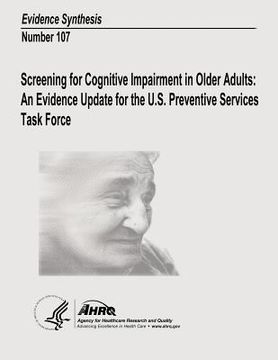Screening for Cognitive Impairment in Older Adults: An Evidence Update for the U.S. Preventive Services Task Force: Evidence Synthesis Number 107 (en Inglés)
Reseña del libro "Screening for Cognitive Impairment in Older Adults: An Evidence Update for the U.S. Preventive Services Task Force: Evidence Synthesis Number 107 (en Inglés)"
Dementia is an acquired condition that is characterized by a decline in at least two cognitive domains (e.g., loss of memory, attention, language, or visuospatial or executive functioning) that is severe enough to affect social or occupational functioning. Patients with dementia may also exhibit behavioral and psychological symptoms. The proposed Diagnostic and Statistical Manual, version 5 (DSM-V) subsumes dementia under a new syndrome, "major neurocognitive disorder." Patients with major neurocognitive disorder experience a significant cognitive decline that is significant enough to interfere with independence in instrumental activities of daily living (IADLs), but this decline cannot be wholly due to delirium or another mental disorder, such as schizophrenia. Based on its etiology, dementia can be classified as degenerative, vascular, or other. The major dementia syndromes in older adults include: Alzheimer's disease, vascular dementia, frontotemporal dementia, dementia with Lewy bodies, Parkinson's disease with dementia, and dementia of mixed etiology. In these dementia syndromes, abnormal deposits that accumulate in the brain are believed to contribute to deterioration of brain function and dementia. The exact etiological mechanisms for many types of dementia, however, have not been clearly defined. Mild Cognitive Impairment (MCI) is distinguished from dementia in that cognitive impairment is not severe enough to interfere with independence in daily life. Researchers describe this condition using various terminology that includes differences in diagnostic criteria and underlying constructs, such as MCI, cognitive impairment no dementia, age-related cognitive decline, mild neurocognitive disorder, and mild cognitive disorder. The International Working Group on Mild Cognitive Impairment established the current, and perhaps most commonly used, criteria for MCI as: cognitive decline as evidenced by self and/or informant and/or clinician report and impairment on objective cognitive tasks, and/or evidence of decline over time on objective tasks; preserved basic activities of daily living (ADLs) (or minimal impairment in complex instrumental functions); and does not meet DSM-IV, ICD-10 criteria for a dementia syndrome. MCI is thought to be an intermediate phase between normal cognition and dementia. In 2003, the USPSTF concluded that there was insufficient evidence to recommend for or against routine screening for dementia in older adults (I statement). This recommendation was based on an evidence review that indicated that while some screening tests had good sensitivity, they had only fair specificity in detecting cognitive impairment and dementia. While this review found evidence that several drug therapies had a beneficial effect on cognitive function, the magnitude of this benefit was small. In 2011, we developed a work plan for this evidence review to address the previous review's evidence gaps and support the USPSTF in updating its previous recommendation. This updated recommendation is focused more broadly on screening for cognitive impairment, including both dementia and mild cognitive impairment (MCI). This evidence review was designed to assess 1) the net benefit and diagnostic accuracy of brief screening instruments to detect cognitive impairment in older adults, and 2) the net benefit of the commonly used treatment and management options for older adults with MCI or early dementia and their caregivers. Our review primarily focuses on screening adults in primary care, rather than specialty care settings (e.g., neurology or memory clinics), and the management of screen-detected people with cognitive impairment, excluding delirium. As a result, this review includes the treatment and management of people with MCI and mild to moderate dementia, as opposed to moderately-severe or severe dementia.

